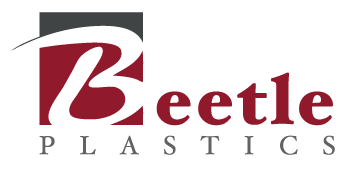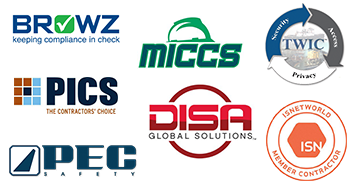Corrosion Resistance and Corrosion Resistant Products
Fiberglass Reinforced Polymers (FRP) can be formulated to be corrosion resistant.
One of the many advantages of using Fiberglass Reinforced Polymers (FRP) is that they can be formulated to be corrosion resistant. At Beetle Composites all of our FRP pipe for fluid services will have a corrosion barrier or liner. The type and thickness of this corrosion barrier/liner will depend upon the specific service environment For example, The thickness of a corrosion barrier/liner can range from a 40 mil (0.040″) for cooling water applications, to over 200 mil (0.200″) SPI type for wet chlorine gas service.
HOW IS THE CORROSION BARRIER/LINER CREATED?
Corrosion resistance of FRP is a function both of resin content and the specific resin used in the laminate. Generally speaking, the higher the resin content, the more corrosion resistant the laminate. Ergo, when building the laminate, the surface area nearest the corrosive or caustic medium is 90% resin and 10% glass (i.e. surfacing-veil layer). For instances where an extremely corrosive media is present the surfacing-veil layer is then followed by a layer comprised of 75% resin and 25% glass. Higher glass content may be used where less corrosive resistant qualities are needed.
Click here to view Ashland Resin Selection Guide for Corrosion Resistant FRP Applications
FRP CORROSION RESISTANT PRODUCTS ARE INNOVATIVE AND COST-EFFECTIVE
The inherent corrosion resistant characteristic of our FRP makes it a cost-effective, strong, light-weight solution for corrosion resistant equipment applications in the chemical process industries and in water and waste water treatment areas.
HOW DOES FRP SAVE YOU TIME AND RESOURCES?
In a filament wound composite pipe, the cost of adding a corrosion barrier/liner is not all that great in comparison to the true cost of the pipe. The selection of the proper type and thickness of the corrosion barrier/liner can more than double the service life of the pipe. The addition of a corrosion barrier/liner can become an important cost savings to the end user, providing the lowest cost per year of service life.
FRP CORROSION RESISTANCE FOR INDUSTRIAL SOLUTIONS
- Hydrochloric acid
- Acetic acid
- Wet chlorine gas
- Ferric chloride
- Hydrogen sulfide
- Sulfur dioxide fumes
- Sodium hypochlorite
FRP CORROSION RESISTANCE FOR INDUSTRIAL PLANT, WATER AND WASTE WATER PROCESSES
- Sludge storage
- Clearwell storage
- Raw and pure water
- Flocculants
- Acid waste neutralization
- Caustic storage
- Industrial waste water
- Industrial water
- Cement industry waste water
- Animal/grease rendering
- Food processing waste
- Oily waste water
- Acid mist
- Chlorides
- Aeration






